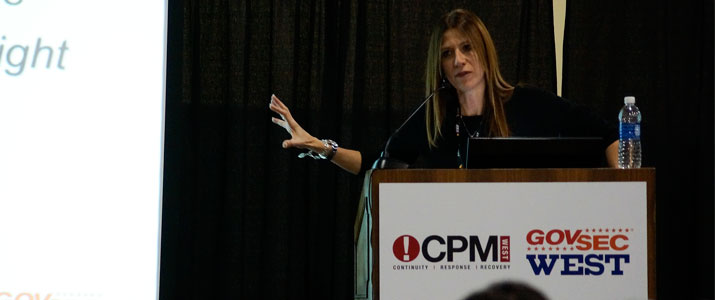
PTSD Discussed at GovSec West
Dr. Tania Glenn discussed the aftereffects of terrorism and how companies can rebuild resilience and a positive attitude in their workforce.
- By Jamie Friedlander
- Nov 21, 2013
 At GovSec West 2013, Dr. Tania Glenn from Tania Glenn and Associates, PA, presented on PTSD in a session titled “The Ugly Aftermath of Terrorism: Solutions for Rebuilding Resilience.” The audience—ripe with ex-cops, current cops, and business owners—listened as she discussed not only the detrimental effects of PTSD, but also what symptoms to look for and the importance of properly treating the condition.
At GovSec West 2013, Dr. Tania Glenn from Tania Glenn and Associates, PA, presented on PTSD in a session titled “The Ugly Aftermath of Terrorism: Solutions for Rebuilding Resilience.” The audience—ripe with ex-cops, current cops, and business owners—listened as she discussed not only the detrimental effects of PTSD, but also what symptoms to look for and the importance of properly treating the condition.
Glenn touched on various traumatic events that have left workers with PTSD over the last decade or so, including 9/11, Hurricane Katrina, Hurricane Rita, the Oklahoma Bombing, the recent explosion in Texas and the Iraq and Afghanistan Wars. Before discussing PTSD in particular, she outlined the various types of stress—acute stress, delayed stress, burnout stress and post-traumatic stress disorder—in order to properly weave in how PTSD relates to stress as a whole.
When discussing PTSD, Glenn discussed how the flight or fight response works in those who work in high-stress, critical jobs, such as soldiers, police officers and disaster recovery crews. For example, when soldiers are on-site in somewhere like Iraq or Afghanistan, they are in a constant state of fight or flight. So when they finally land on US soil and can relax in their own home, the change in their biochemistry can lead to quietness, anger and PTSD.
Glenn stressed the importance of treating each soldier, cop or worker individually and triaging each person separately, because not all people deal with stress in the same way. Not only should family members and employers be aware of the signs of PTSD, but they should insist that those suffering from it seek help or manage their stress through exercise, relaxation, staying hydrated and controlling substance use, among other things. Signs and symptoms to look out for include dilated pupils, gastrointestinal issues, dry mouth, chills, confusion, depression, anger, silence and more.
Glenn and her company, based in Austin, TX, provide PTSD and EMDR treatment. She works with companies such as Southwest Airlines and US Airways as well as border patrol, law enforcement and the defense community. She has been at the scene of several national crises, such as 9/11 and the Oklahoma Bombing.
About the Author
Jamie Friedlander is an associate content editor at Security Products magazine.